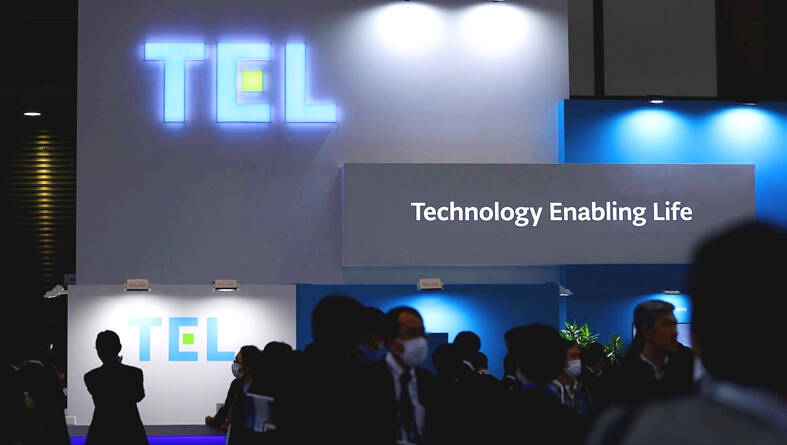Tokyo Electron adds US$12bn on strong demand from China – 台北時報
Tokyo Electron Ltd’s market capitalization surged by more than US$12 billion yesterday, hitting a record high after the company hiked guidance for the year on the strength of sales to China.¥
The chipmaking gear producer rose 13 percent in Tokyo yesterday, hitting a valuation of ¥15.9 trillion (US$106 billion) with its highest close on record. It came after the company lifted its operating income forecast for the year to March by 11 percent to ¥445 billion. That beat analyst estimates and came on the back of a December quarter where China accounted for 46.9 percent of its sales.
Demand is surging from Chinese semiconductor ventures buying up legacy equipment as US trade curbs prevent them from acquiring the best chips for tasks like artificial intelligence (AI) development.
Photo: Bloomberg
Tokyo Electron also said it expected investment from DRAM makers to rebound this year. The stock prices of two of its customers, South Korea’s Samsung Electronics Co and SK Hynix Inc, rose on optimism about their prospects given rising AI-driven demand.
“We have entered a frenzy stage of buying anything tech,” Asymmetric Advisors Pte Ltd strategist Amir Anvarzadeh said.
Tokyo Electron’s surge followed a near doubling of chip designer Arm Holdings PLC’s market value after better-than-expected earnings, and a related spike in parent Softbank Group Corp’s stock.
“However, given that China has been the biggest single engine for Tokyo Electron, we see big risks that have been ignored,” he said.
The view from the company itself is more sanguine, with one executive projecting strong sales in China continuing for the next year or two.
“We expect strong demand from China to continue or grow stronger still,” Tokyo Electron deputy general manager Hiroshi Kawamoto said on an earnings call last week.
China only makes a small percentage of the chips it needs, and Kawamoto sees the country investing aggressively to lower its reliance abroad.
Taiwan Semiconductor Manufacturing Co (TSMC, 台積電) yesterday said it has obtained permanent authorization from the US government, confirming that the items and services subject to US export control regulations could continue to be provided to TSMC’s Nanjing fab without the need for vendors to get individual licenses. Issuance of the validated end-user (VEU) authorization maintains the status quo for production of semiconductors at its Nanjing fab, TSMC said in an e-mail. In October 2022, the chipmaker secured a one-year general authorization from the US government, which allows TSMC to continue its fab’s operations in Nanjing, China, the chipmaker said. The general
AI-DRIVEN: Strong artificial intelligence server demand, along with a mild recovery in smartphone and PC demand, would fuel the semiconductor sector’s growth, TSMC said Taiwan Semiconductor Manufacturing Co (TSMC, 台積電) , the world’s biggest contract chipmaker, yesterday said a surge in artificial intelligence (AI) server demand would fuel global semiconductor revenue growth this year at an annual rate of about 10 percent, excluding the memorychip sector. “We are seeing very strong AI server demand. We are looking at a yearly growth rate of 2.5 times higher than last year,” TSMC deputy cochief operating officer Cliff Hou (侯永清) said during an annual technology symposium in Hsinchu. The industry’s growth would also be aided by a mild recovery in smartphone and PC demand, both estimated to increase shipments
AI COMPETITION: The planned supercomputer would be ‘at least four times the size of the biggest GPU clusters that exist today,’ Elon Musk was quoted as saying Billionaire tech mogul Elon Musk has told investors he plans to build a supercomputer dubbed “gigafactory of compute” to support the development of his artificial intelligence (AI) start-up xAI, an industry news outlet reported on Saturday. The Tesla Inc CEO wants the supercomputer — which would string together 100,000 Nvidia H100 graphics processing units (GPU) — to be operational by fall next year, and he “will hold himself personally responsible for delivering it on time,” The Information said. Nvidia’s H100 family of powerful GPUs dominate the data center chip market for AI, but can be hard to obtain due to high demand. The
RETALIATORY: The threat of levies comes as the EU is about to announce the results of its probe into China’s EV subsidies, which might result in it imposing its own tariffs China has signaled it is ready to unleash tariffs as high as 25 percent on imported vehicles with large engines, as trade tensions escalate with the US and EU. The China Chamber of Commerce to the EU said in a statement on X that it was informed about the potential move by “insiders.” The levies would affect European and US automakers and have a “significant” impact on relations with the EU, it said. Beijing is ramping up threats of retaliation as a deadline looms for the EU to announce the results of its probe into China’s electric vehicle (EV) subsidies. The bloc
